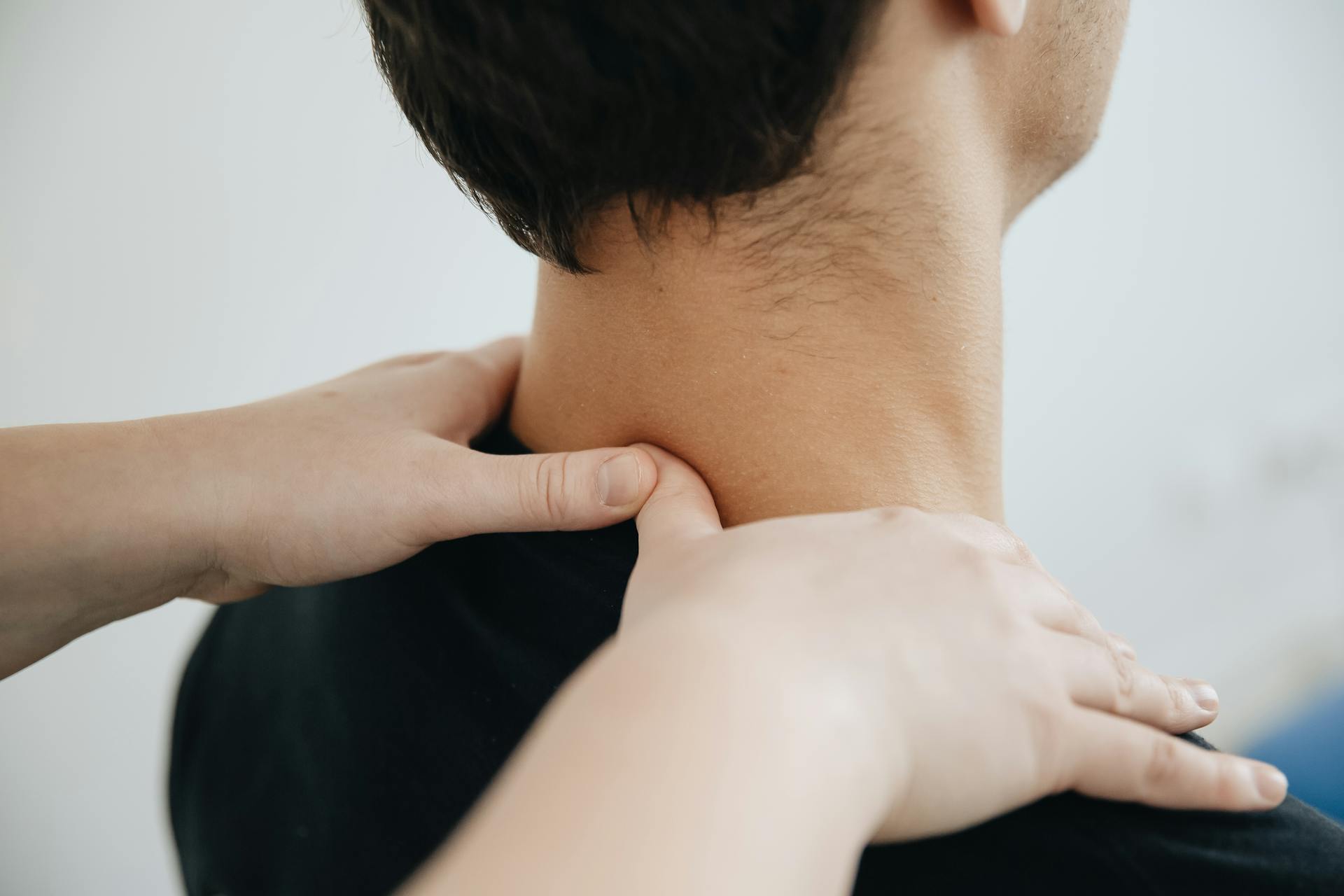How often do you wake up with a sore neck after sleeping? If you’re like up to 50% of people, you’ll run into some form of neck pain at least once every year — and for many, that pain hits hardest first thing in the morning.
Sleep position plays a big role, but the truth is that your neck can be thrown off by everything from daily strain to poor posture and even certain health conditions. The good news is that with the help of a few self-care methods, you won’t always have to resort to “toughing it out” when morning neck pain strikes.
Below, we’ll cover five helpful remedies for neck pain after sleeping, plus a few simple prevention tips to add to your daily (or nightly) routine.
3 Possible Causes of a Sore Neck After Sleeping
Why is it so common to wind up with a sore neck after rolling out of bed? Neck pain can show up for a wide range of reasons — but if you’re often waking up with aches or stiffness, here are some common factors to look at:
How You Sleep
If you’ve never paid much mind to your sleep position (or you tend to roll around unconsciously throughout the night), your cervical spine and neck muscles could be under more stress than you realize. Specifically, a few major sleep positions and habits that may lead to neck strain include:
- Sleeping on your stomach. This position puts the most strain on your cervical spine, since your neck has to stay twisted throughout the night in order for you to breathe.
- Pillows that are too high or too low (as well as too fluffy or stiff) can mean your neck is constantly craned at a painful, awkward angle, without the right amount of support.
- Falling asleep in a chair. We’ve all dozed off in a chair after an exhausting day — but making it a habit can strain your neck, forcing it into unnatural positions while stressing your muscles, tendons, and joints.
Poor Posture From the Prior Day(s)
Another major source of neck pain in the morning? Poor posture from the prior day — including forward head posture and rounded shoulders — which may contribute to muscle strain and tightness in the upper body.
Like other joints in the body, your neck has an optimal, neutral position that helps minimize the stress on your joints and soft tissue. And much like your knees, your neck is always working to hold up weight further up the chain, so even a slight misalignment can add to soreness or stiffness.
Dr. Melissa Strike at UCHealth Grandview Medical Center notes that for every extra inch your head bends forward, it can mean an additional 10 pounds of pressure on the neck. So, if you regularly wake up with achy or stiff neck muscles, try to be more mindful of your posture throughout the day — it could be playing a bigger role than you realize.
Health Conditions
Morning neck pain is often a simple case of muscle strain or poor sleep habits, but that doesn’t always paint the full picture. For example, health conditions like cervical spondylosis (or neck arthritis) tend to become more common as we get older, and lifestyle factors like poor sleep hygiene or forward posture can worsen their symptoms.
Beyond arthritis, other conditions that may contribute to a sore neck in the morning include:
- Injuries, like whiplash or neck muscle strain
- Overuse, inflammation, or delayed onset muscle soreness (DOMS) due to physical exertion
- Spinal issues, such as a herniated disc or spinal stenosis
- A pinched nerve
- Very rarely, serious health conditions like cancer or meningitis (although these are uncommon and typically come with other symptoms)
When To Talk To Your Doctor About Neck Soreness
Most mild neck aches aren’t anything to stress over, but in rare cases, they may signal a more serious underlying condition. That said, it’s worth scheduling an appointment if your soreness is disrupting your daily life, or if it’s recurring, limits your range of motion, or shows up along with other odd or uncomfortable symptoms. Even if your pain isn’t severe, getting a check-up can help you avoid long-term issues down the road.
Additionally, for a clear guide on when neck pain should be treated as an emergency, be sure to check out this page from the Cleveland Clinic.
5 Simple Remedies for Morning Neck Tension
Whether your neck is sore from one bad night of sleep, poor posture, or overworked muscles, the right self-care tools can often bring meaningful relief.
Here are five simple remedies to soothe those sore muscles and help your mornings feel a little easier:
Try Massage Therapy
When your neck is tense after sleeping, your muscles and connective tissue (also called fascia) are likely playing a role, which can make massage a helpful remedy. Gentle techniques focused around the back-of-neck muscles can help boost mobility and ease tension, all the while supporting healthy, oxygen and nutrient-rich blood flow to your muscle tissue.
A bonus? Massage is a natural, intuitive tool that we can use on ourselves, so you don’t need to spend a fortune or visit a spa to try it. Two easy options for morning neck soreness include:
Hands-On Neck Massage
This simple hands-on neck massage can be done anytime, anywhere, and requires just a few easy steps:
- Take a few deep breaths, and mindfully release the tension in your neck and shoulder muscles.
- Place your right hand on the back left side of your neck. Use your palm and fingers to lightly knead the muscles, starting just below the skull and working your way down toward the upper back. Continue for 60 seconds.
- Tilt your head to the right to gently stretch your left side neck muscles. Then, use your fingers to massage in small, circular motions — starting from the top edge of your back, and making your way up the back of the neck.
- If you feel any knots or trigger points, feel free to hold the pressure for an extra few seconds.
- Repeat steps 2-4 with the right side of your neck.
- Finally, glide your fingers up the back of your head, placing your thumbs on the small muscles at the base of your skull (also called the suboccipitals).
- Massage in light, circular motions for 30 seconds more.
Opt for a Neck-Friendly Massager
Alternatively, you can reach for a trusted, HSA/FSA-eligible massage tool like the MedMassager Neck Massager for some quick morning pain relief. Simply:
- Use the straps to align the massager around your neck muscles.
- Turn it to its gentlest setting, allowing your muscles to warm up to the pressure for 60 seconds.
- Increase the pressure and heat settings to your comfort level.
- Lean back and allow your neck muscles to soak up the massage for 5-15 minutes.
Give Your Muscles a Stretch
The next best way to tackle morning neck pain? Try a few simple neck stretches. Mobilizing your muscles in the AM is a great way to break up stiffness, improve blood flow, and even curb muscle pain.
In one 2016 controlled trial, researchers looked at the effects of four weeks of stretching on office workers with neck pain. Those in the stretching group experienced bigger improvements in pain and neck function compared to those in the control group.
So, what kind of stretches should you try? Not every movement will work for everyone, especially if you have medical conditions affecting the spine. But some basic, commonly-recommended options may include:
Side-to-Side Tilt
A side-to-side tilt — sometimes called a neck-side bend — is great for loosening the traps, scalene muscles, and sternocleidomastoid (SCM) muscles in the sides of the neck. To try it:
- Sit or stand with upright yet comfortable posture.
- Slowly tilt your head to the left until you feel a stretch in the right side-neck muscles. Hold for 6-10 seconds.
- Repeat with the other side.
Neck Glides (Chin Tucks)
Although they might feel a bit odd at first, chin tucks are great for strengthening the deep neck flexors while gently stretching the back-of-neck muscles. Here are the steps:
- Stand or sit upright with your shoulders relaxed, and slightly nod your chin in toward your chest.
- Keep your jaw muscles relaxed, and slowly retract your chin backward to feel a stretch in the back of the neck. (Tip: Try not to tilt your head down; instead, aim to keep your chin level as you bring it back.)
- Slowly relax back into your normal posture. Repeat 5-7 times, a few times per day.
Try Heat To Relax Your Muscles
Many types of neck stiffness — whether it’s simple muscle tightness or deeper, chronic soreness — can respond positively to heat therapy. Even just a few minutes of warmth can improve blood flow, support tissue elasticity, and even help to curb muscle spasms.
If you prefer moist heat, a toasty AM shower is a great option. But if you’re short on time, you could opt for a few minutes using a steamed towel or a simple heating pad instead.
Consider Ice or Cold To Reduce Inflammation
Heat is your friend when it comes to chronic tension, but if you have acute inflammation — like from a pulled neck muscle or another injury — cold therapy might be the better remedy.
Simply grab a cold pack or bag of frozen veggies, and apply it for 5-10 minutes every few hours to help ease swelling and discomfort. (Note: Be sure to avoid over-icing, as cold can be irritating to the skin and muscle tissue if used for too long.)
Over-the-Counter Pain Medications
While not as “natural” as the other remedies in this list, over-the-counter pain medications can certainly have a time and place in a morning neck pain care routine. NSAIDs like ibuprofen, for example, can work well to provide temporary relief — and their anti-inflammatory effects may even help curb swelling.
With that said, be sure to stay at or under the recommended dose and frequency mentioned on the bottle, and check with your doctor or pharmacist ahead of time if you’re taking any other medications.
Prevention Tips
When you roll out of bed with a sore neck, the right self-care tools can bring some much-needed relief — but what if you want to reduce your odds of dealing with it in the first place? Here are some proactive steps you can take:
Adjust Your Sleep Setup
One simple way to prevent neck soreness in the morning? Take an in-depth look at your sleep setup, and make necessary adjustments where you can. Some improvements to consider include:
- Making a conscious effort to avoid sleeping on your stomach. Instead, aim to practice side sleeping or back sleeping, which tend to be more neck-friendly.
- Make sure to choose a pillow with a height that allows your cervical spine to stay in a neutral position — not too puffy or too flat.
- Choose the right material. A feather pillow, memory foam pillow, or cervical pillow can all help provide proper support while you sleep.
Strengthen Supporting Muscles
As you probably know, morning neck pain isn’t always just about your sleep routine. If you often find yourself in poor posture or spend a lot of time sitting, the muscles that support your cervical spine can weaken over time — and this can increase your odds of soreness, stiffness, and upper body misalignment.
Luckily, certain neck-focused movements can help you build strength and balance things out. A few options include:
- Chin tuck head lifts: Lie on your back with your knees bent and feet flat on the floor. Tuck your chin inward slightly, and lift your neck a few inches off the floor. Hold for five seconds, and repeat 5-10 times.
- Neck extensions. Lie on your stomach with your head hanging just off the edge of a bed. Engage the muscles along your back to lift your head back toward the ceiling, holding for a few seconds.
- Prone T: Lie face down, and lift your arms straight out to your sides. Squeeze your back and shoulder blade muscles together to bring your arms backward. Hold for three seconds, and repeat 7-10 times.
Common Questions About Neck Pain in the Morning
From how anxiety impacts neck pain to which type of massage works best, here are a few answers to common questions that come up when waking up with a sore neck:
Can Stress or Anxiety Make Neck Pain Worse?
Yes. Research has shown that anxiety and neck pain are closely connected, sometimes creating a painful cycle where their symptoms fuel each other — likely in part due to stress hormones that increase muscle tension and impact pain perception.
The bottom line? If neck pain shows up frequently for you, it may be worth giving some care to your mental health, too.
What Type of Massage Is Best for Neck Pain?
If you’re planning on seeing a professional for neck massage, you might wonder: which modality should you try? While the “best” one can vary from person to person, some of the most soothing massage options for neck soreness include:
- Swedish massage, which uses light gliding and kneading motions to warm up the muscle tissue, improve elasticity, and relieve pain.
- Myofascial release (or slow, sustained massage), which is great for targeting knots and built-up tension in the upper body muscles.
- Heat-infused massage, whether that’s at a spa with a hot stone therapy session, or at home with the help of a heat-powered massager.
Should I Stretch My Neck Right Away in the Morning?
If your neck isn’t severely stiff or painful, a few gentle stretches are unlikely to do much harm first thing in the morning. However, some experts and anecdotal reports suggest letting your body “warm up” ahead of time to help reduce strain and make stretching more effective. So, it may be worth taking a quick walk — or even stepping into a hot shower for a few minutes — to help loosen your muscles up beforehand.
The Bottom Line
Waking up with a sore neck is common, but that doesn’t mean it has to slow down your day. Light stretches, massage, and heat can be helpful ways to break up stiff tissue, while cold therapy can soothe acute pain and swelling. And if you could use a little more temporary relief, OTC pain relievers can help reduce inflammation and discomfort while you heal.
Looking for more ways to boost mobility, promote circulation, and ease neck soreness from the comfort of your home? Pick up the MedMassager Neck Massager today, or explore more HSA/FSA-eligible home tools here.



